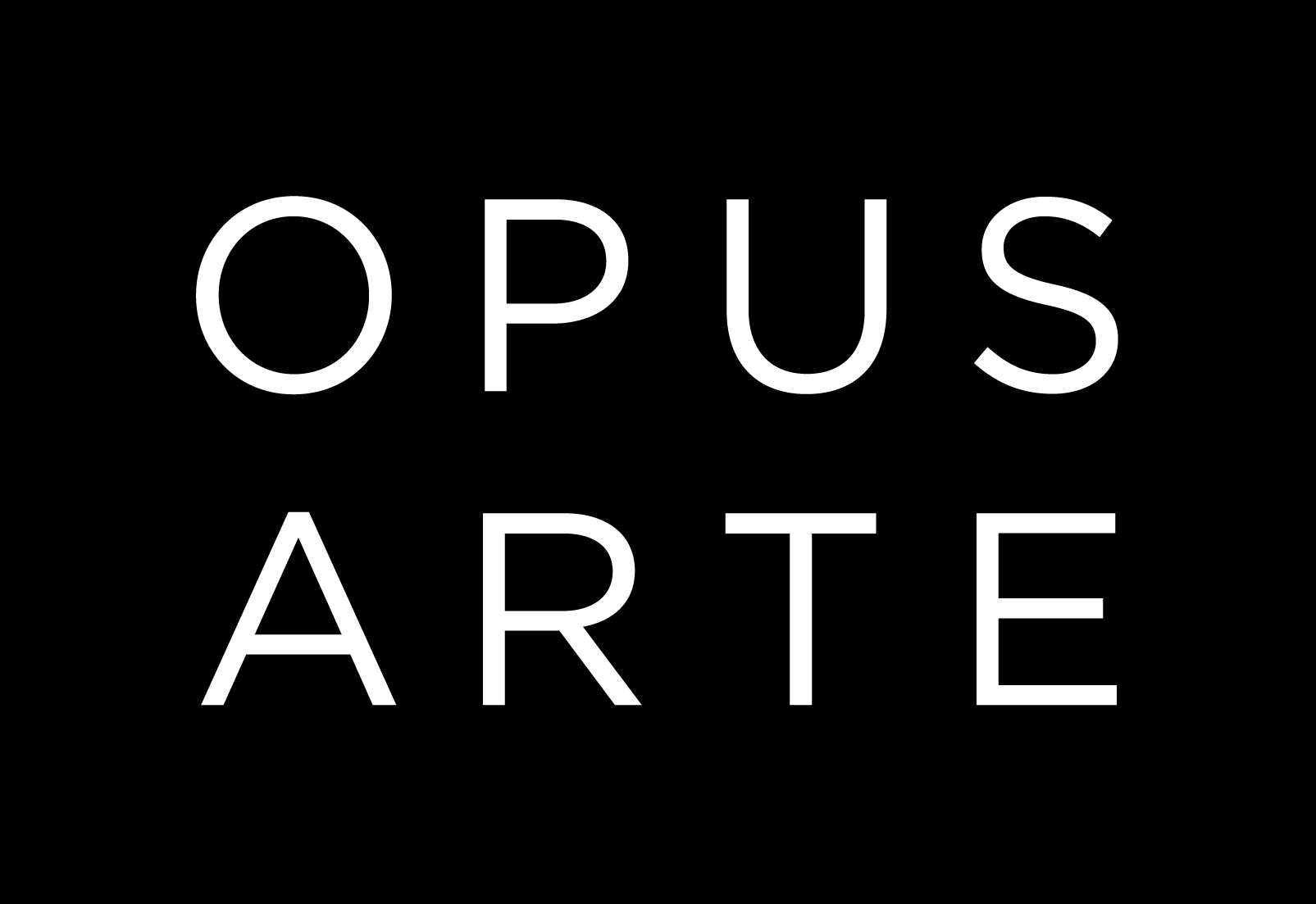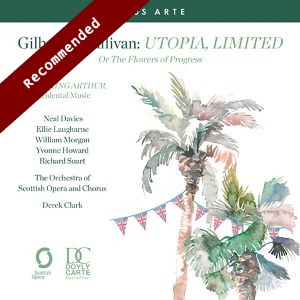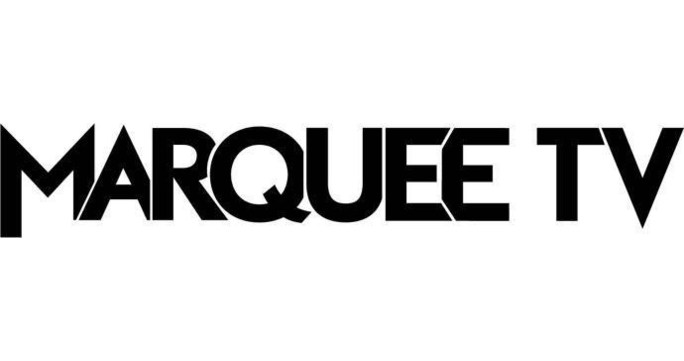Sir Arthur Sullivan (1842-1900) & WS Gilbert (1836–1911)
Utopia, Limited, Savoy Opera in 2 acts
Sir Arthur Sullivan
King Arthur, Suite from Incidental Music (ed. Wilfred Bendall)
King Paramount: Neal Davies (baritone)
Lady Sophy: Yvonne Howard (mezzo-soprano)
Princess Zara: Ellie Laugharne (soprano)
Captain Fitzbattleaxe: William Morgan (tenor)
Chorus and Orchestra of Scottish Opera/Derek Clark
rec. 2021, Scottish Opera Production Studios, Glasgow
Texts not provided
Opus Arte OACD9053D [127]
After a rather public falling out in 1890, Gilbert and Sullivan patched things up with Utopia, Limited which was first performed at the Savoy in October 1893. It is a splendid work which for me suffers little in comparison with its more famous predecessor The Gondoliers. In the piece, the pair parody British Victorian life, society and Empire. It is a satirical opera with Colonialism its biggest target. Utopia, Limited played for 245 nights in its premiere run but was never subsequently revived by D’Oyly Carte. When they did come back to it in 1975, it was the Centenary season, and the company memorably performed all fourteen operas in sequence at the Savoy. The Decca recording of Utopia made at the same time features the same cast as those performances.
These new records date from Scottish Opera’s performances in Glasgow and Edinburgh in November 2021. They took the show to London, too, the following Spring, with one night at the Hackney Empire. The music is pretty well complete; in King Paramount’s first scene, Decca made a cut but the newcomer is untouched. Similarly, we get a full version of Zara’s scene with Fitzbattleaxe in Act 1. Both the new records and Decca still snip a little bit of the scene before the “Eagle high” chorus but it is a trifle. In the notes, conductor Derek Clark warns us that some of the original dialogue from the 1890s has been changed to suit our times. He says lines, some may have found derogatory have been altered. The only place I could tell this happened is in the finale of Act 1 where Zara talks of the natives of Utopia as being “little better than half-clothed barbarians”. This has indeed been made more PC. The dialogue would have presented Scottish Opera with more difficulties. This is not a problem though – there isn’t any! Lack of any dialogue is an issue. Utopia, Limited has quite a complicated plot and Gilbert’s text lampoons court etiquette, delves into economic theory as well as setting out the important love interests and political intrigue all good operetta needs to be successful. There are some great gags too. Without any of this, you will need to find a full libretto; thankfully, this will be easy to source online without cost. Decca in 1975 had no dialogue either (except for a minute or so, at the very end as Scaphio and Phantis stir the islanders into rebellion) so there we are.
The Opus Arte label spread Utopia, Limited over two CDs, with an act on each disc. The second CD also contains some lovely music Sullivan wrote for King Arthur. We begin with the Overture – fairly standard, I hear you say, but you may not be aware that there isn’t one! On his 1975 record, Royston Nash preceded the introduction (which is based on the later Drawing Room music) with Sullivan’s Imperial March, written for the opening of one of those splendid buildings near the Museums in South Kensington. That piece is an exact contemporary of Utopia, and they fit really well together and it was genius of Decca to use it. Here though, Scottish Opera do even better: John Owen Edwards (a name we will all perhaps be familiar with) has crafted a brilliant overture based on themes from the work. It marches with pomp and circumstance; it fizzles and sparkles. I loved it; it is a wonderful miniature tone picture of the work in the best tradition and a perfect curtain opener, which Derek Clark conducts perfectly.
The plot is this: A South Pacific Island named Utopia is ruled by a King (Paramount). He though is under the controlling influence of a couple of baddies, Scaphio and Phantis. They will get their sidekick Tarara to blow him up unless he does everything they say. Gilbert calls this type of system “despotism tempered by dynamite”. Paramount is enraptured by all things English and has sent his eldest daughter Zara to Girton College, Cambridge. His two younger girls remain on Utopia, and he has hired a governess, Lady Sophy, to educate them to be the very models of polite English young ladies (yes, it is a very similar situation to The King and I). Paramount expects all girls in his Island domain to take note, and Lady Sophy shows them off regularly in public. Her accompanying remarks on deportment and training are a must hear and she repeats them at various locales: “The lecture’s ended – in ten minutes space, ‘twill be repeated in the marketplace”. Zara arrives back from England. She has brought back with her six “flowers of progress”; men, who will put Utopia on the British path, straight and true. One of them, Captain Fitzbattleaxe is her sweetheart.
Mr. Goldbury, a Company promoter, expounds on the merits of the wonderful Joint Stock Companies Act of 1862. Paramount is smitten with the idea. His Kingdom of Utopia will become a company with limited liability: Utopia, Limited. The love interest in the opera is between Fitzbattleaxe and Zara, she is also loved by Scaphio and Phantis but that was never going to happen! We find out Lady Sophy is too on an amorous hunt to find a Kingly suitor. At first, she finds the Utopian monarch to be just like all the rest, but Paramount and Lady Sophy resolve their issues and also unite romantically. There is a cabinet meeting between King Paramount and his advisors that goes extremely well, considering it was the first time for the King. The subsequent Royal drawing room court rituals went off without incident too (the plate of mixed biscuits being handed round helped). Despite all this, there are still grumblings in the masses. The Army and Navy have been so well constituted, there are no more wars to fight. The local councillor Zara brought back has enacted such progress in sanitation, the Doctors are unemployed. The English legal structure, Utopia has embraced, has meant crime has vanished. The lawyers are out of work! “Down with these reforms” scream the natives, egged on by the two conspirators Scaphio and Phantis. Zara arrives at the last though. She forgot something. The one glorious foundation to Britain’s success. How silly of her to forget. “Government by party”: The two-tier political system. Nothing will endure as one party will always reverse what the other has done. That’s it. Utopia is content.
Neal Davies as King Paramount is very good. In his duets with Lady Sophy, he is generous of tone, resonant and warm. His biggest moment, and indeed probably the most famous scene in the opera is the Minstrel scene (CD2: track 3) “Society has quite forsaken all its wicked courses”. Prior to the scene, Paramount is worried the preparations are wrong. “Are you sure this is all in accordance with the practice at the Court of St. James’s?”. Lord Dramaleigh reassures him it certainly is in accordance with the practice at “St. James’ Hall”. This is a reference to the music hall which in 1893 hosted Christy’s Minstrels show, a hugely popular entertainment that we would shudder at nowadays. The scene brought the house down at the Savoy, with dance routines, banjos and tambourines. The tambourines here, though deftly played, are all that remain of the original setting. Unless you knew the history of the work, this scene’s real nature might well pass by un-noticed. Davies is also marvellous in the trio set pieces with his advisors Scaphio and Phantis. In fact, the first one with its “ho ho’s” flows with more fluency than on the old D’Oyly Carte set of 1975. As Lady Sophy we hear the rich voice of Yvonne Howard. She is superb. Her first solo: “Bold faced ranger” is accurately delivered with impeccable diction and a mastery of the vocal line. She is a storyteller too and really embellishes the text: “Don’t forget the references”. Her second act aria “When but a maid of fifteen year” is even better and the duet with Paramount as they express their love for one another: “Oh, rapture unrestrained” is very nicely sung. Lovely accompaniment with some very ornithological woodwind playing from the Scottish players here too. In the original Decca records the two roles were taken by Kenneth Sandford and Lyndsie Holland.
Zara is sung on the new set by soprano Ellie Laugharne. She sang Phyllis in ENO’s Iolanthe in 2018 and in its 2023 revival. She also sang in Scottish Opera’s Gondoliers, done in tandem with these performances of Utopia. She takes a while to settle into the role. If I am being über-critical, I could dwell on how her tone can turn squally at times and indeed lose its focus when pushed high into her upper register. She does have a sweet sound, though, and that can be heard to best effect when she is in duo with her Captain. They are adorable together, first in Act 1 with Fitzbattleaxe’s “breastplate bright” getting in the way, and better still in their beautifully blended “sweet and low” moment in Act 2. What radiance here. Laugharne comes through resolute and proud by the end, leading off the final chorus perfectly. Her lover is sung by tenor William Morgan. This singer has sung Frederic in Pirates for ENO as well as Tamino. For Scottish Opera, like Ellie Laugharne he featured in that Gondoliers as well as taking on Camille in The Merry Widow and Candide. Fitzbattleaxe has a fantastic solo scene at the start of Act 2. In a Donizettian aria: “A tenor, all singers above” he explains how the effects of love adversely affect his singing voice – he can’t do himself justice. The best thing is that he most certainly can. It is a great set piece though and Gilbert’s text is inspired. Our tenor likes to roll his r’s, too, it seems. Morgan’s is a lovely portrayal of Fitzbattleaxe. Much as I enjoyed the contribution of soprano and tenor in these new records, I cannot say they displace the wonderful Pamela Field and Meston Reid for Royston Nash in 1975. Field especially is unforgettably lovely with a textbook technique, and I wouldn’t want to be without her Zara.
For Decca the D’Oyly Carte fielded John Reed and John Ayldon as the baddies. In the new records we have a wonderful blend of youth and experience: the veteran Richard Suart and the suave-sounding Arthur Bruce. Their best scene for me is the trio with Tarara where they develop their “capital plot” for scuppering things at the end. In the roles of the girls Nekaya and Kalyba we have Catriona Hewitson and Sioned Gwen Davies. They are nicely portrayed, as is the assumption of Mr. Goldbury by the good, clear baritone of Mark Nathan. The Chorus of Scottish Opera (prepared by young conductor Jonathon Cole-Swinard, of whom more later) seem a little on the light side when compared with the D’Oyly Carte. They sing with accuracy and conviction, though, and the great numbers like “O maiden, rich in Girton lore”, “for we are the escort: First Life Guards!” and of course “Eagle high in cloudland soaring” go swimmingly.
The orchestra under Derek Clark are first class. It is a zippy, fizzy, fun reading. The sound quality is very good with decent stereo separation. A test for me of a conductor’s prowess in this piece would have to be the Drawing Room music (CD2: track 5). I can well close my eyes and imagine Sir Thomas Beecham caressing this music with his RPO. Unfortunately, that was never a reality, as to my knowledge Beecham never looked at Utopia. Derek Clark maybe doesn’t have the Beecham magical touch, but this little musical portrait under his expert direction is nonetheless exquisite. There are several examples where Clark makes a deft turn or lightens a phrase. He is an expert in this music, and I am so glad these records were made with him on the podium. The whole band of players don’t put a foot wrong.
After the main event we are treated to nearly eighteen minutes of music in a choral suite devised of the most substantial items in the incidental music Sullivan wrote for J.R. Comyns Carr’s drama King Arthur. There would also have been some small musical sections to cover entrances and exits on stage and I understand he wrote some melodrama; nonetheless, we have most of what matters here in this suite. It is delightful music and worth some commentary in the booklet – but gets none. Choirs of lake spirits precede the ceremony of knightly procession at Camelot. A funeral march for Elaine is followed by a final chorus of lament as Arthur is borne on his barge to Avalon. It is a nicely constructed piece which is rarely heard due to its requiring choir and orchestra. I am not sure how well it sits with Utopia, Limited but it is good to have it. It has been recorded before on Naxos by Andrew Penny with Irish forces.
I am still very much attached to the original Royston Nash records of Utopia, Limited. When D’Oyly Carte put on that centenary season in 1975, most of the audience for Utopia had surely never seen it. The queues for tickets were so great that they had to put repeat performances on at the Royal Festival Hall later that Summer – four performances, I believe. Harold Wilson, the then Prime Minister, who was a big fan of G&S was in the audience and came out on stage at the end of the Savoy performance to congratulate the company. Pamela Field’s Zara is very special and unsurpassed for me. That being said, I am going to treasure these new records. They were clearly made with great care and with love. They also mark the retirement after twenty-five years of Derek Clark as Head of Music at Scottish Opera. I came across on YouTube the tribute the company made to mark his retirement by several of his colleagues, not least Jonathon Cole-Swinard who leads it. He uses the famous number “Society has quite forsaken all its wicked courses” as his starting point and you will see where they go with it if you type “Derek will do it” into YouTube’s search facility. It is a sincere, witty, heartfelt and hilarious piece and a worthy tribute. This recording of Utopia, Limited is another more lasting one. Do try and hear it.
Philip Harrison
Other cast
Scaphio: Richard Suart (baritone)
Phantis: Arthur Bruce (baritone)
Princess Nekaya: Catriona Hewitson (soprano)
Princess Kalyba: Sioned Gwen Davies (mezzo-soprano)
Lord Dramaleigh, a British Lord Chamberlain: Glen Cunningham (tenor)
Captain Sir Edward Corcoran, K.C.B., of the Royal Navy: Francis Church (baritone)
Mr Goldbury, A Company Promoter: Mark Nathan (baritone)
Sir Bailey Barre, Q.C: Osian Wyn Bowen (tenor)
Mr Blushington, of the County Council: Richard Pinkstone (tenor)
Tarara: Phil Gault (baritone)
Phylla: Zoe Drummond (soprano)



















